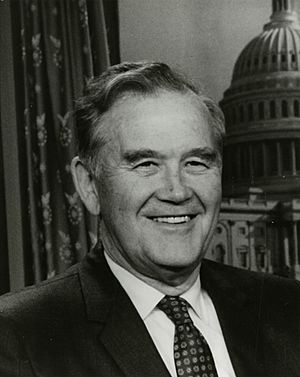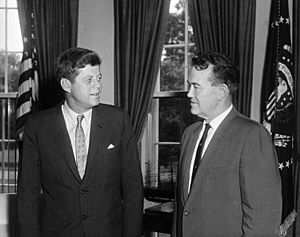Quentin Burdick facts for kids
Quick facts for kids
Quentin Burdick
|
|
|---|---|

Official portrait of Burdick c. 1975
|
|
| United States Senator from North Dakota |
|
| In office August 8, 1960 – September 8, 1992 |
|
| Preceded by | Norman Brunsdale |
| Succeeded by | Jocelyn Burdick |
| Member of the U.S. House of Representatives from North Dakota's At-large district |
|
| In office January 3, 1959 – August 8, 1960 |
|
| Preceded by | Usher L. Burdick |
| Succeeded by | Hjalmar Nygaard |
| Personal details | |
| Born |
Quentin Northrup Burdick
June 19, 1908 Munich, North Dakota, U.S. |
| Died | September 8, 1992 (aged 84) Fargo, North Dakota, U.S. |
| Political party | Democratic |
| Spouses |
Marietta Janecky
(m. 1933; died 1958) |
| Children | 4 |
| Relatives | Usher L. Burdick (father) Eugene A. Burdick (brother) |
| Education | University of Minnesota University of Minnesota Law School |
Quentin Northrup Burdick (born June 19, 1908 – died September 8, 1992) was an American lawyer and politician. He was a member of the North Dakota Democratic-NPL Party. He represented North Dakota in the U.S. House of Representatives from 1959 to 1960. He then served in the U.S. Senate from 1960 until his death in 1992. When he passed away, he was one of the longest-serving senators in the country.
Contents
Growing Up and School
Quentin Burdick was born in Munich, North Dakota. He was the oldest of three children. His parents were Usher Lloyd Burdick and Emma Cecelia Robertson. His father, Usher Burdick, was also a politician. He was a Republican who served as Lieutenant Governor of North Dakota and later as a U.S. Representative.
Quentin's mother was the daughter of the first white settler in the area west of Park River. His brother, Eugene Allan Burdick, became a judge. His sister, Rosemary, married Robert W. Levering, who was a U.S. Representative from Ohio.
In 1910, Quentin's family moved to Williston. There, his father worked as a farmer and a lawyer. Quentin enjoyed riding and training wild ponies on his father's ranch. He went to local public schools. In 1926, he graduated from Williston High School. He was the class president and captain of the football team.
Quentin went to college at the University of Minnesota. He earned a Bachelor of Arts degree in 1931. He played football in college as a blocking back. He was also president of his fraternity, Sigma Nu. A knee injury from football kept him from serving in the military during World War II. In 1932, he earned his law degree from the University of Minnesota Law School. Soon after, he became a lawyer.
Starting His Career
After law school, Quentin Burdick joined his father's law firm in Fargo. He helped farmers who were losing their land because they couldn't pay their loans. This happened a lot during the Great Depression, a time when many people had no jobs or money. He later said that helping these people made him want to work for a better life for everyone. In 1933, he married Marietta Janecky. They had four children together. Marietta passed away in 1958.
Like his father, Quentin became involved in politics. He joined the Nonpartisan League (NPL). This group was a populist and progressive movement that worked with the Republican Party. Quentin ran for several political offices as an NPL candidate but did not win. He tried for attorney general in 1934 and 1940. He also ran for state senator in 1936 and lieutenant governor in 1942.
Quentin believed the NPL should join with the Democratic Party. He thought this would make the progressive vote stronger in the state. In 1946, he ran for Governor of North Dakota as a Democrat, but he lost again. He supported former Vice President Henry A. Wallace in the 1948 presidential election.
In 1956, the NPL officially joined with the Democratic Party. They formed the North Dakota Democratic-Nonpartisan League Party. That same year, Quentin ran for the U.S. Senate against Republican Milton Young. He lost, which was his sixth and final election defeat before winning a major office.
Working in Congress
In the U.S. House of Representatives
In 1958, Quentin's father, Usher Burdick, was worried about losing his re-election. He offered to step down if the NPL would support Quentin for his seat in the U.S. House of Representatives. Quentin received the NPL's support in April and won the election that November. He became the first Democrat-NPL member to be elected to the House from North Dakota.
While in the House, Quentin was part of the House Interior Committee. He worked to support the Garrison Diversion Project. This project aimed to bring water from the Missouri River to North Dakota. He was known for supporting workers' rights. He also disagreed with the farm policies of President Eisenhower. In his first speech in the House, Quentin asked for the U.S. Secretary of Agriculture, Ezra Taft Benson, to resign.
In the U.S. Senate
After Senator William Langer passed away in November 1959, Quentin ran in a special election. This election was held on June 28, 1960, to fill the rest of Langer's term. His opponent was Republican Governor John E. Davis. During his campaign, Quentin received strong support from the National Farmers Union. He called for high prices for farm products and strict rules on how much grain farmers could grow. His campaign slogan was "Beat Benson with Burdick." This referred to Agriculture Secretary Benson, whose policies were not popular with North Dakota's wheat farmers. Quentin won the election by a very small number of votes.
Nine days after the election, Quentin, who was a widower, married Jocelyn Birch Peterson. She had two children from a previous marriage. Together, Quentin and Jocelyn had one son.
On August 8, 1960, Quentin resigned from his House seat. He was then sworn in as a U.S. Senator. He won a full six-year term in 1964, defeating Republican Thomas Kleppe. He continued to win re-election easily in 1970, 1976, 1982, and 1988.
In 1987, Quentin became the chairman of the Senate Environment and Public Works Committee.
Quentin earned the nickname "King of Pork." This was because he focused almost all his efforts on bringing federal money and projects to North Dakota. North Dakota was a rural and less developed state at the time.
His Passing
In September 1992, Quentin Burdick passed away at the age of 84. He died from heart failure at St. Luke's Hospital in Fargo. After his death, his wife, Jocelyn Burdick, was appointed by Governor George Sinner to fill his Senate seat. She served until a special election could be held.
See also
- Politics of the United States
- United States Senate special election in North Dakota, 1960
- United States Senate election in North Dakota, 1964
- United States Senate election in North Dakota, 1970
- United States Senate election in North Dakota, 1976
- United States Senate election in North Dakota, 1982
- United States Senate election in North Dakota, 1988
- List of United States Congress members who died in office (1950–99)
 | Audre Lorde |
 | John Berry Meachum |
 | Ferdinand Lee Barnett |


